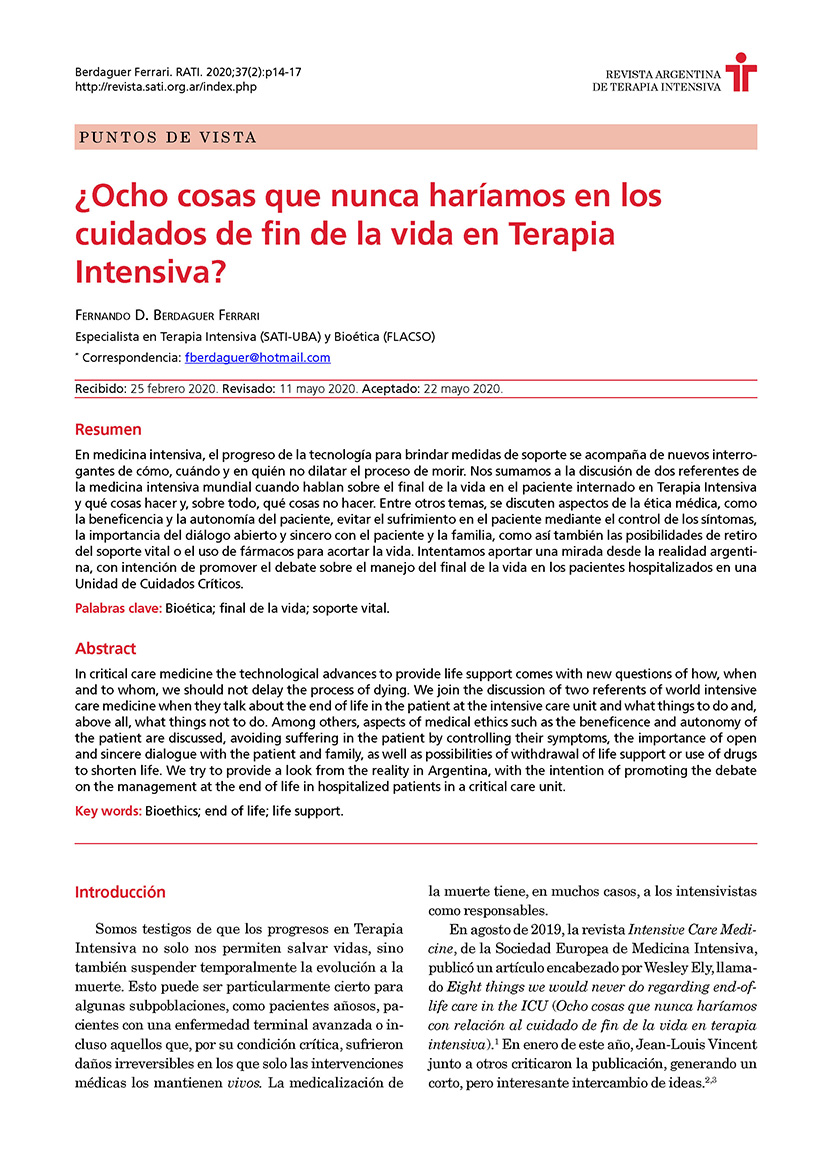¿Ocho cosas que nunca haríamos en los cuidados de fin de la vida en terapia intensiva?
Contenido principal del artículo
Resumen
En medicina intensiva el progreso de la tecnología para brindar medidas de soporte se acompaña de nuevos interrogantes de cómo, cuando y en quien, no dilatar el proceso de morir. Nos sumamos a la discusión de dos referentes de la medicina intensiva mundial cuando hablan sobre el final de la vida en el paciente internado en terapia intensiva y que cosas hacer y, sobre todo, que cosas no hacer. Entre otras cosas, se discuten aspectos de la ética médica como la beneficencia y autonomía del paciente, evitar el sufrimiento en el paciente mediante el control de los síntomas, la importancia del dialogo abierto y sincero con el paciente y la familia, como así as posibilidades de retiro de soporte vital o uso de fármacos para acortar la vida. Intentamos aportar una mirada desde la realidad argentina, con intención de promover el debate sobre el manejo del final de la vida en los pacientes hospitalizados en una unidad de cuidados críticos.
Detalles del artículo
Sección
Los artículos publicados en la Revista Argentina de Terapia Intensiva se distribuyen bajo la licencia Creative Commons Atribución 4.0 Internacional (CC BY 4.0).
Esta licencia permite usar, copiar, compartir, redistribuir, adaptar y reproducir el material en cualquier medio o formato, incluso con fines comerciales, siempre que se reconozca adecuadamente la autoría y la fuente original de publicación.
La revista no retiene los derechos patrimoniales de autor (copyright). Los autores conservan la titularidad de los derechos sobre sus trabajos y conceden a la revista el derecho de primera publicación.
No se aplican restricciones adicionales al uso, distribución o reutilización de los contenidos más allá de las establecidas por la licencia mencionada.
Cómo citar
Referencias
BibliografÃa
- Ely, E.W., Azoulay, E., Sprung, C.L. Eight things we would never do regarding end-of-life care in the ICU. Intensive care medicine, 2019;45(8), 1116-1118.
https://link.springer.com/article/10.1007/s00134-019-05816-6
- Vincent, J.L., Creteur, J., Taccone, F.S. Things we would never do regarding end‑of‑life care in the ICU. Intensive care medicine, 2020;46(1), 145-146. https://link.springer.com/article/10.1007/s00134-019-05816-6
- Ely, E.W., Azoulay, E., Sprung, C.L. Distinction between good palliative care and intending death. Intensive care medicine, 2020;46(1), 147-148.
http://dx.doi.org/10.1016/j.jcrc.2013.08.025
- Juliarena, A. I. Cuidar la dignidad, un desafÃo para todos en las UCI. Revista Argentina de Terapia Intensiva, 2017; 34(1), 45-52. http://revista.sati.org.ar/index.php/MI/article/view/486
- Mathews, K.S., Nelson, J.E. Palliative care in the ICU of 2050: past is prologue. Intensive care medicine, 2017;43(12), 1850-1852.
https://doi.org/10.1007/s00134-017-4828-7
- Hall, R.I., Rocker, G.M. End-of-life care in the ICU: treatments provided when life support was or was not withdrawn. Chest, 2000;118(5), 1424-1430. https://doi.org/10.1378/chest.118.5.1424
- Thompson, B.T., et al. Challenges in end-of-life care in the ICU: Statement of the 5th International Consensus Conference in Critical Care: Brussels, Belgium, April 2003: Executive summary. Critical care medicine, 2004; 32(8), 1781-1784. https://doi.org/10.1007/s00134-004-2241-5
- Beauchamp TL, Childress JF. Principles of biomedical ethics. 7ª ed. New York: Oxford University Press; 2013.
- De Simone, G., et al. Glosario sobre Decisiones en el Final de la Vida. BoletÃn del Consejo Académico de Ética en Medicina, 2012;9(1). http://ppct.caicyt.gov.ar/index.php/bcaeem/article/view/1713
- Swindell, J.S., McGuire, A.L., Halpern, S.D. Shaping patients' decisions. Chest, 2011;139(2), 424-429. DOI: 10.1378/chest.10-0605
- Binks, A.P., Desjardin, S., Riker, R. ICU clinicians underestimate breathing discomfort in ventilated subjects. Respiratory care, 2017;62(2), 150-155. https://doi.org/10.4187/respcare.04927
- Rocker, G.M., Heyland, D.K., Cook, D.J., Dodek, P.M., Kutsogiannis, D.J., O’Callaghan, C.J. Most critically ill patients are perceived to die in comfort during withdrawal of life support: a Canadian multicentre study. Canadian Journal of Anesthesia, 2004;51(6), 623. https://doi.org/10.1007/BF03018407
- Yeh, A., Pietras, C., Wallenstein, D., Hu, P. End of life in the neurological intensive care unit: is extubating to comfort care comfortable?. Journal of pain and symptom management, 2019;58(4), e14-e16. https://doi.org/10.1016/j.jpainsymman.2019.07.004
- Luz, C.F.D., Melnik, M.G., Bernardino, E., Oliveira, E.S.D. Compreendendo as restrições dos técnicos de enfermagem sobre a permanência de acompanhantes em unidade de terapia intensiva aberta. Texto & Contexto-Enfermagem, 2009;18(2), 306-312. https://doi.org/10.1590/S0104-07072009000200014.
- Giannini, A. When the letter “F†meets the letter “Dâ€: Beneficial impact of open visiting and family presence on incidence of delirium among ICU Patients. Critical care medicine, 2017,45(10), 1785-1786. DOI: 10.1097/CCM.0000000000002631
- La Calle, G.H., Oviés, Ã.A., Tello, V.G. A plan for improving the humanisation of intensive care units. Intensive care medicine, 2017,43(4), 547-549. https://doi.org/10.1007/s00134-017-4705-4
- Hernández-Marrero, P., Pereira, S.M., Carvalho, A.S. Ethical decisions in palliative care: interprofessional relations as a burnout protective factor? Results from a mixed-methods multicenter study in Portugal. American Journal of Hospice and Palliative Medicine, 2016;33(8), 723-732. https://doi.org/10.1177/1049909115583486
- Vincent, J. L., et al. "Piece" of mind: end of life in the intensive care unit statement of the Belgian Society of Intensive Care Medicine. Journal of critical care, 2014;29(1), 174-5. http://dx.doi.org/10.1016/j.jcrc.2013.08.025
- Valdez, D., Fukuda, E., Mardyks, A., Mano, V. Eutanasia, calidad de vida y retiro de soporte vital. Estudio en 5 Centros de cuidados crÃticos. Revista Argentina de terapia intensiva, 2009,26(1),1-9. http://revista.sati.org.ar/index.php/MI/article/view/226
- Gherardi, C., Cháves, M., Capdevila, A., Tavella, M., Sarquis, S., Irrazábal, C. La muerte en un servicio de terapia intensiva: influencia de la abstención y retiro del soporte vital. Medicina (Buenos Aires), 2006; 66(3), 237-241. https://www.medicinabuenosaires.com/demo/revistas/vol66-06/3/LA%20MUERTE%20EN%20UN%20SERVICIO%20DE%20TERAPIA%20INTENSIVA.pdf

